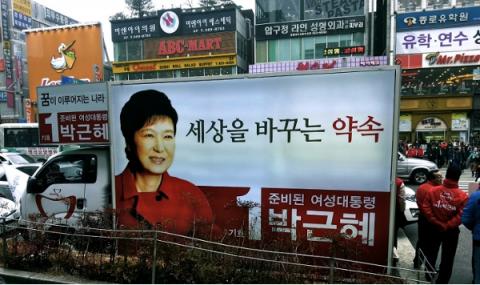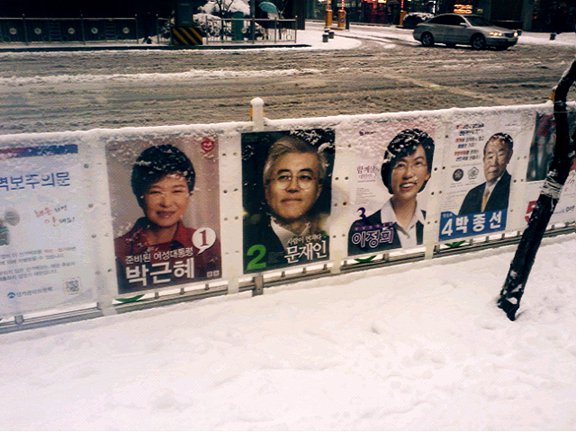How Park Geun-Hye Defeated the Odds and Became Korea’s First Female President

The classroom erupted in dissent as students clamored to be heard on Election Day.
“Old people like Park!” yelled 11-year-old Eun-Seo Cho . “Grandparents and parents will vote for her.”
“Moon’s name sounds like the Korean word for problem,” insisted 12-year-old Min-Ji Kim. “That is not good, but young people like him.”
Cho states that her older friends told her Park wants to make the school day longer and make new rules for using the Internet.
South Korea made history on December 19th with newly elected female President Park Geun-Hye. Although a milestone, the election created contention among many Koreans. With seven candidates, the race ultimately fell upon conservative Park and liberal former human rights lawyer, Moon Jae-in.
With temperatures in the low teens, Koreans bundled up and stood in frigid lines to cast their vote.
In the Shadow of a Legacy
No stranger to the presidential palace, Park served as First Lady to her father, former Korean military ruler Park Chung-Hee, when a North Korean gunman assassinated her mother in 1974. In 1979, the chief of his own security services assassinated her father.
“I have no family to take care of and no children to pass wealth to. You, the people, are my family and your happiness is the reason that I stay in politics,” Park, unmarried, said at a press conference December 18th, 2012.
Park Geun-Hye’s father ruled South Korea for 18 years and is credited for the country’s rapid economic growth. However, the many human rights abuses present under his authoritarian rule leave his legacy both lauded and condemned.
The major topic concerning voters was economics and Park claims that her victory will help rebuild Korea’s economy. She has promised to redistribute wealth and reform conglomerates- ones that her father created.
The leader also plans on opening a dialogue with North Korea. “Peace bought with extravagant gifts is a false peace,” she said. “True peace is achieved through trust-building efforts on the foundation of a strong deterrent.”
Throughout the campaign, Park struggled between exalting the spirit of her father and apologizing for his transgressions.
The Liberal. The Contender.
Moon Jae-in stood as Park’s main contender in the opposition Democratic United Party. The former human rights lawyer was chief of staff to late President Roh Moo-hyun. Jailed in the 1970s for political activism by Park’s father, the stage was set for a heated election in the shadow of a slowing economy and hostility from northern neighbors.
The son of a North Korean refugee, Moon stood on a platform promising unconditional aid to North Korea, proposing a $10 billion jobs package, and taxing the wealthy.
When accepting his DUP nomination, Moon pledged to work towards creating a “fair and just world, a world where people come first.”

He wanted to improve diplomacy with North Korea and “open an era of 'South-North Economic Union' for cooperative growth between North and South.” This Joint Committee on Inter-Korean Economic Cooperation was a promise Moon made to improve the economy on the Korean peninsula during a time of global economic instability.
Adopting the “Sunshine Policy” of his predecessors, Moon pledged to reunify the two Koreas if elected. “Fairness and justice will be the base of my government,” Mr. Moon said in his primary acceptance speech.
Criticisms
Throughout the campaign, Park has been highly criticized by her opponents. During the first televised debate of the campaign, progressive candidate Lee Jung-Hee blasted Park stating her sole purpose for being at the debate was to “bring down Park Geun-hye.” Lee brought up 600 million won gift from Park’s father’s secret fund gifted by former ROK President Chun Doo-hwan. Park admitted to receiving and accepting the money, and stated that it was given to support her siblings following her father’s assassination.
“I didn‘t think it through and just accepted it,” said Park claiming she will “give it all back to society later.”
Lee called Park self-righteous and arrogant. She cited inconsistencies in her words and actions, and stated that if elected, Park would become a “dictatorial queen”.
“She blocked legislation that would preserve neighborhood commercial zones,” she said. “She said she would abolish irregular employment, and then blocked a plan to make the minimum wage the average wage. She’s no different from Marie Antoinette saying, ‘Let them eat cake.’”
The debate focused less on the important campaign issues and more on the attacks from candidate Lee.
Even Park’s party, the Saenuri Party, faced criticism. The conservative political party, tainted with scandal, changed its name in February 2012 to the “New Frontier Party” after growing voter dissatisfaction.
Election Outcome
Foregoing critics, Park Geun-Hye also had many fans. Votes, a family history as engrained as Korean history and a little bit of luck made her campaign a success.
Korea is a right-favoring country; four of the six presidents elected since the constitution in 1987 have been conservative.
Like Kim and Cho stated, surprisingly accurate, voter demographics played a large role in the election outcome. Older people did, in fact, vote more for Park, while younger voters made their mark in droves for Moon. According to a survey conducted by Korean news networks KBC, MBC and SBS, 62 percent of voters in their 50s and 72 percent of voters in their 60s supported Park. Moon garnered support from 66 percent of voters in their 20s and 30s.
“I hoped Jae-in Moon would be elected as did most of the young generation,” said student and graphic designer Aeji Byun. “He didn't have a fancy and outstanding background but he looked honest to me.”
Middle-aged Korean voters were evenly split in their voting patterns.
Only time will tell the execution of Park’s platform, but many Korean residents just want an improvement in social life. “I just want this country to be better for the poor and the old,” said teacher Michelle Lee. “No more rich people getting richer, and poor people poorer.
Many campaign promises aimed at social issues. By 2014, Park pledged to provide a basic pension of 200,000 won (approx. $189) to all senior citizens over 65 years of age.
She also promises to reach out to N. Korea with more humanitarian aid.
“All I wish for now is that our new president would just do her best to look out for little but not least things in our society instead of overrated promises and plans,” said Byun.
Unmarried and living alone, the new president has devoted herself to South Korea. In a patriarchal society, Park’s election is impressive. Only time will tell if campaign promises will be met, social issues improved and economic advances upheld.
Author Bio:
Alexis Barnes is a contributing writer and photographer at Highbrow Magazine.






























































































































































































































































































































